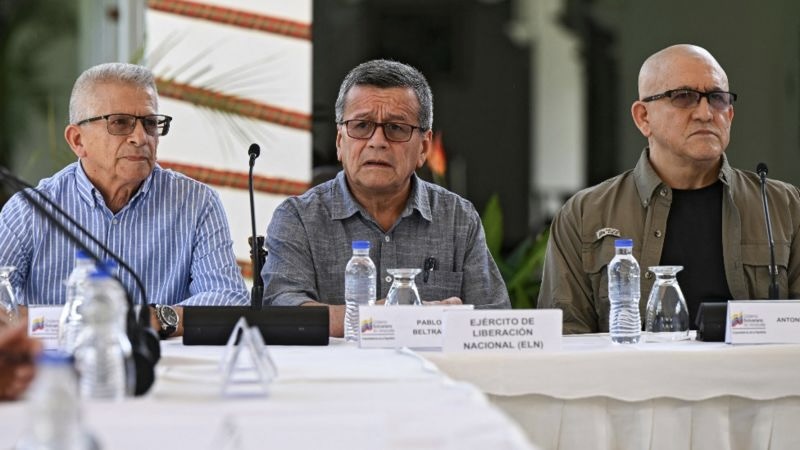On Wednesday, January 4, Colombian Interior Minister, Alfonso Prada, announced that the national government had suspended the bilateral ceasefire with the country’s largest active leftist guerilla group, the National Liberation Army (ELN). The announcement came a day after the ELN publicly denied that they had agreed to a ceasefire.
On December 31, 2022, President Gustavo Petro reported that his government had reached an agreement on a six-month bilateral truce with five irregular armed groups including the ELN; the dissident groups of the demobilized FARC: the Estado Mayor Central, the Segunda Marquetalia; and the drug cartels Clan del Golfo and Los Pachencas. The head of state also reported that the ceasefire would be in force from January 1 to June 30, adding that it would be “extendable depending on the progress of the [peace] negotiations.”
However, on Tuesday, January 3, the ELN dialogue delegation rejected the announcement, stating that no such proposal had been discussed at the dialogue table.
“The ELN dialogue delegation has not discussed any bilateral ceasefire with the Gustavo Petro government, therefore there is still no agreement on this matter. On various occasions we have pointed out that the ELN only complies with what is discussed and agreed upon at the Dialogue Table where we participate. A unilateral government decree cannot be accepted as an agreement,” said the group in a statement.
The guerrilla organization recalled that “in the first round of peace talks held in Venezuela, which ended on December 12, 2022, they only agreed on the institutionalization of the roundtable and the adjustments to the agenda had begun.”
The organization said that “in the next round of negotiations to be held in Mexico, it was agreed to complete the adjustment of the talks agenda,” adding that “once we conclude what is planned we are ready to discuss the proposal for a bilateral ceasefire, to examine the terms that make an agreement possible. We understand the Government Decree as a proposal to be examined in the next round.”
The organization’s statement came after the government issued specific decrees for each of the organizations, in which it set the parameters for the said truce.
On the morning of Wednesday January 4, in a press conference, Interior Minister Prada announced the suspension of Decree 2657 which established a six-month bilateral truce with the ELN.
“Given the position publicly assumed yesterday, according to which the protocol of said cessation should be brought to the dialogue table, we have decided to suspend the legal effects of Decree 2657 of December 31, 2022, and in the following round, dialogue on this matter would be reactivated,” he said.
Prada added that “given the desire for peace expressed by the ELN and while the bilateral cessation protocol is being studied at the dialogue table, we invite this organization to declare a verifiable truce in response to the imperative call of the ethnic, territorial and peasant communities to maintain the bilateral cessation and non-violence in their territories.”
The interior minister reported that except for the ELN, the other four groups had expressed their willingness to participate in the truce. Similarly, he reported that the Military Forces had already been ordered to “establish the mechanisms to cease criminal offenses against these groups, if there is compliance with the agreements reached [with them] before the end of 2022.”
Prada recalled that the United Nations, the Catholic Church and several countries supported the government decision to stop fighting with these groups. However, he added that after the reluctance of the ELN, the military offensive against them would continue until a consensus on the matter was reached.
Meanwhile, Antonio Garcia, the top leader of the insurgent group, wrote on Twitter that during the unilateral ceasefire called for by the group during the end of the year holidays, state actors had continued carrying out operations against the ELN.
While many lamented the confusion over the bilateral ceasefire, others have pointed out that this sort of agreement is normally only reached through drawn out negotiation after several rounds of talks. In the peace process held between the Colombian government and the Revolutionary Armed Forces of Colombia, a lasting bilateral ceasefire was only achieved in 2015, three years after the process began and continued uninterrupted.
In the “New Year Message” released by the ELN on January 1, 2023, the group highlighted that its primary goal for both remaining in arms and engaging in the peace process is to “transform the conditions of the dispossessed.” It added that “The absence of armed uprising will never be synonymous with peace. Profound transformations will not be gifted by anyone. Today, there is an opportunity to resume the debate on the need for a more just society, authentically democratic, conceived and governed by the majorities.”
President Petro’s plans to bring total peace to Colombia after more than six decades of internal armed conflict, which has killed around 450,000 people and displaced over 8 million, continue.





